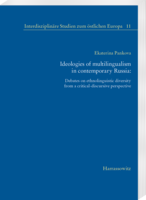|
weitere Titel zum Thema:
Download:
Bitte beachten Sie: Mit digitalen Produkten in Ihrem Warenkorb
wird die Bezahlung nur per PayPal möglich. Der Download dieser Produkte wird bereitgestellt, wenn die Bezahlung bestätigt ist. The book examines multilayered discursive processes of (un)making the key macro-level policies toward ethnolinguistic diversity in contemporary Russia, where the last two decades witnessed a gradual shift away from the active sponsorship of multilingualism on behalf of the state. To explore this policy shift and its underlying ideologies, the study draws on critical and discursive approaches to language policy. Ekaterina Pankova takes the Republic of Tatarstan and the role of its two official languages, Russian and Tatar, in education as a case in point to investigate how top-down policies are created, interpreted, and contested in three different contexts: the “official” policy discourse of the federal center, parliamentary debates, and online reader commentary on the compulsory study of Tatar. Focusing on discursive strategies employed by various policy stakeholders, the author examines how they construct Russian and Tatar as policy objects and structure the relationship between speakers of the dominant language and members of ethnolinguistic minorities. Her analysis reveals multiple differences in the representation of sociolinguistic realities by federal and regional policy actors, tracing how these discursive tensions are grounded in divergent beliefs about the value, use, and fair distribution of linguistic resources in a multilingual society.
|
|||||||||||||||||||||||||||||||||||||||






